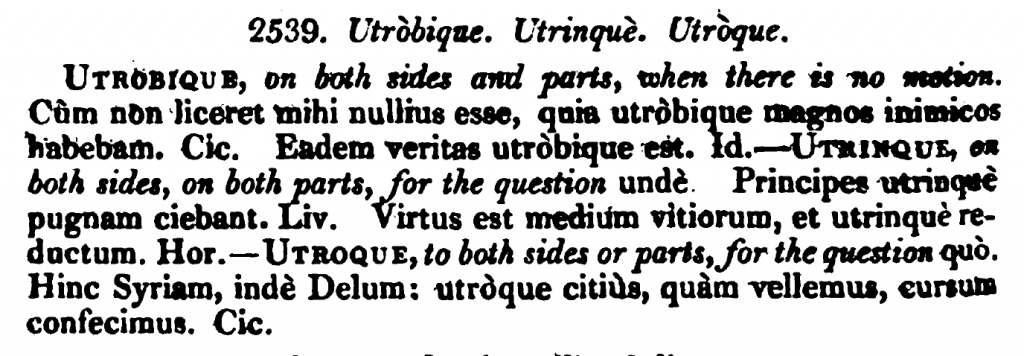Contents
- Introduction
- Comprehensive Latin synonym Works
- Shorter & Abridged Works: Quick fix?
- Latin Only Synonym Works
- Latin Dictionary + Synonyms
- Synonym Works for Writing in Latin
- Do you Believe in Synonyms? A warning
- Overview: Which Synonym Dictionary is Best?
- Ready to Start Learning about word nuances?
Has this ever happened to you? You’re happily reading a Latin text when you come across a word you’re not sure about.
You open the dictionary, look up the word, learn the definition, go back to reading.
A little further down you stumble on another word. Same thing. Look up the word, learn the… and confusion sets in. The two words have basically the same definition.
“What’s the difference?” “Is there a difference?”
After reading this article you’ll know how to solve these age-old questions.
Introduction
Do Nuances of Meaning Matter in Latin?
Through the years, I have spent many a night pondering the difference in meaning between so-called synonyms, in order to better understand the nuances of the text. I have learned an immense amount from dictionaries of Latin synonyms through the years. This recently became an indispensable tool as we were writing our new book Pugio Bruti: A Crime Story in Easy Latin: Since limiting the vocabulary was paramount, I had to find Latin words that would work in a wide variety of contexts, while still being classically attested in that particular context. But for learners, and readers are such dictionaries necessary?
Frankly, while reading a text, you can often do without knowing the precise nuance a word carries; a general notion will often suffice to pull you through to the author’s next thought.
But if you desire to deepen your knowledge of Latin, and peer through the seams of synonyms, or to drape your own thoughts with just the right words, you need to study the differences in meaning.
This can be a challenge but fortunately there is help…
Where to Start?
Scholars have been writing on Latin synonyms and their differences from antiquity (e.g. Varro, and later Isidore of Seville) to today.

In the 19th century the genre flourished with a host of authors penning dictionaries of Latin synonyms but, sine cura sis, I won’t list them all.
Here I will rather focus on particularly useful ones that I use in my own reading and research.
They date from the 18th to the 20th centuries.
I will present the most exhaustive ones first, more suitable for advanced studies, and then move on to more accessible works.
Luckily, all these dictionaries of Latin synonyms are available as PDFs, to which I have added download links.
Comprehensive Latin synonym Works
Let’s first look at the two principal works, one French and one German.
Gardin Dumesnil
First out is J.B. Gardin Dumesnil’s, Synonymes Latins et leurs significations, first published in 1777, but revised and translated several times.

This is a comprehensive work, containing 7000 groups of synonyms. The descriptions given are brief with examples from Latin authors. There are few, if any, discussions on the distinctions made.
For that we need to turn to the next work on our list.
Download the PDFs here:
- French: Synonymes latins et leurs différentes significations (Paris 1853)
- English (earlier edition): Latin synonyms, with their different significations (1825, London)
- Augmented German edition by Ludwig Ramshorn:
- Ramshorn, Ludwig, Lateinische Synonymik, nach Gardin-Dumesil’s Synonymes latins, Volym 1 (Leipzig, 1831)
- Ramshorn, Ludwig Lateinische Synonymik, nach Gardin-Dumesil’s Synonymes latins, Volym 2 (Leipzig, 1833)
Döderlein

The most comprehensive work on Latin synonyms by far is Ludwig Döderlein’s monumental Lateinische Synonyme und Etymologieen (1826–1838).
In six volumes he unveils the differences between words, giving deeply detailed descriptions while providing his reasoning and arguments for establishing them.

Sometimes there is a hint of absurda diligentia which is always amusing.
Unfortunately, it is only available in German. (Be the first to learn German through a dictionary of Latin synonyms?)
Download the PDFs of Döderlein’s 6‑volume work here:
- Lateinische Synonyme und Etymologieen, Erster Theil, (Leipzig 1826).
- Lateinische Synonyme und Etymologieen, Zweiter Theil, (Leipzig 1827).
- Lateinische Synonyme und Etymologieen, Dritter Theil, (Leipzig 1829).
- Lateinische Synonyme und Etymologieen, Vierter Theil, (Leipzig 1831).
- Lateinische Synonyme und Etymologieen, Fünfter Theil, (Leipzig 1836).
- Lateinische Synonyme und Etymologieen, Sechster Theil, (Leipzig 1838).
- Lateinische Synonyme und Etymologieen, Beilage: Die lateinische Wortbildung, (Leipzig 1839).
Shorter & Abridged Works: Quick fix?
Sometimes your German fails you, or you just don’t need all the 7000 words from Dumesnil. If so, there are several shorter works.

Ramshorn
Ludwig Ramshorn, the German translator of Dumesnil’s work, also published an abridged version of the dictionary for schools.
The descriptions are short without any discussions or arguments for his definitions, making it more accessible and suitable for a quick look.
Its English translation also contains a section on morphology.
Download the PDF here:
- Dictionary of Latin Synonymes for the use of schools and private students with a complete index (Boston 1841)
There is a digital computer version available here:
Döderlein No. 2
Döderlein – whose hand penned six volumes on Latin synonyms – seems to have realised that readers wanted a more streamlined work, some light reading, if you will, so he published an abridged version.
It keeps the various distinctions while dispensing with the reasoning and argumentation behind them.

The abridged work has the added benefit of being available in several languages (English, French and German).
Download PDFs of the work here:
- English: Handbook of Latin Synonyms, (Andover 1859).
- French: Manuel de Synonymie Latine (Lyon 1865).
- German: Handbuch der Lateinischen Synonymik, (Leipzig 1849).
Download a computer version here:
- English Handbook Of Latin synonyms (1874)
Douthat
In brevity and clarity Robert Douthat’s Latin synonymes defined from two standpoints takes the first prize.
To delineate the differences, he moves from the generic to the specific: starting by defining the simple verb (e.g. “habere”) he moves on to compounds (e.g. “exhibeo”).

This disposition makes it drastically different from the other dictionaries but quite interesting.
Download the PDF here:
Latin Only Synonym Works
Thus far we’ve talked about vernacular dictionaries of Latin synonyms. Now it’s time to move on to one wholly in Latin.
Popma
Ausonius Popma’s dictionary of Latin synonyms De differentiis verborum (Turin 1852) gives detailed yet succinct explanations of the differences in meaning, all in Latin.
In comprehensiveness it compares to Ramshorn’s abridged version of Dumesnil.
Popma’s strength is that it’s written entirely in Latin, keeping you thinking in Latin: While looking up a word you’re building your knowledge of synonyms as well as acquiring the vocabulary necessary to discuss differences of meaning in Latin.
A priceless skill.

Download the pdf here:
Latin Dictionary + Synonyms
Wagner
Wagner’s Lexicon Latinum is something in between a regular Latin dictionary and a dictionary of Latin synonyms.

When you look up a word you get the vernacular definition (German, French, Italian, English – depending on the edition) as well as several synonyms, but without explanations as to the different shades of meaning.
With each definition you also get an example of its use.

This compact and useful work provides an overview of the word and its synonyms without discussing their differences.
Download the PDF:
Wagner’s Lexicon Latinum is also available as a searchable digital resource here.
Synonym Works for Writing in Latin
Ogilvie
Last but not least is Prof. Robert Ogilvie’s Horae Latinae; its aim and structure is quite different from other works on Latin synonyms:
Written for composing Latin prose, it gives the Latin equivalents of about 500 English expressions.
It lists the English words or expressions with descriptions of the various ways in which they are to be rendered into Latin.
The definitions are accompanied by many examples taken from classical works.

Use digital version of this dictionary here.
Do you Believe in Synonyms? A warning
A note of warning.
Dumesnil, Döderlein, Popma and the rest have sometimes cut too fine lines between synonyms, differentiating shades of meaning that classical authors do not always observe (o audaciam!).
The difference between words doesn’t necessarily lie in meaning but in register, style, genre, author or time period.
So look to these works for guidance rather than revelations of hidden truths. Compare their definitions with your own view. They do not supplant reading widely and acquiring an intuitive feeling for Latin.
Overview: Which Synonym Dictionary is Best?
We’ve looked at the major works and it’s time to take the next step: using them.
Which one? you may ask. It depends on your situation and need. They all have their strengths. If pressed, I would suggest using a couple in conjunction.
Overview of Dictionaries of Latin Synonyms
Regular dictionary with synonyms:
- Wagner, F., Lexicon Latinum seu universae phraseologiae corpus congestum (Bruges, 1878).
English–Latin: great for writing Latin:
- Ogilvie, R., Horae Latinae (London, 1901).
Shorter dictionaries for quick answers:
- Douthay, R., Latin synonymes defined from two standpoints (1907)
- Döderlein, L, Handbook of Latin Synonymes, (Andover 1859)
- Ramshorn, L., Dictionary of Latin Synonymes (Boston 1841)
All in Latin – For staying in Latin:
- Popma, A., De differentiis verborum (Turin 1852)
Wide selection of words and brief explanations:
- Dumesnil, Synonymes latins et leurs différentes significations (Paris 1853)
The most exhaustive with detailed discussions:
- Lateinische Synonyme und Etymologieen (1826–1838).
Ready to Start Learning about word nuances?

Unraveling the the web of differences can be a hair-pulling, frustrating endeavour.
It’s tempting to write off two synonymous words as identical in meaning. Don’t.
The next time you ask yourself “what’s the difference between…?” I’m sure you’ll go the extra mille passuum and take out your Dumesnil, Döderlein or Popma.
You’ll discover the differences that ultimately bring you closer to the text, to understanding it as the author (may have) intended.
Download All Dictionaries
If you want to download all the dictionaries in one go, I’ve put together a zip-file. Click below to get it.
















